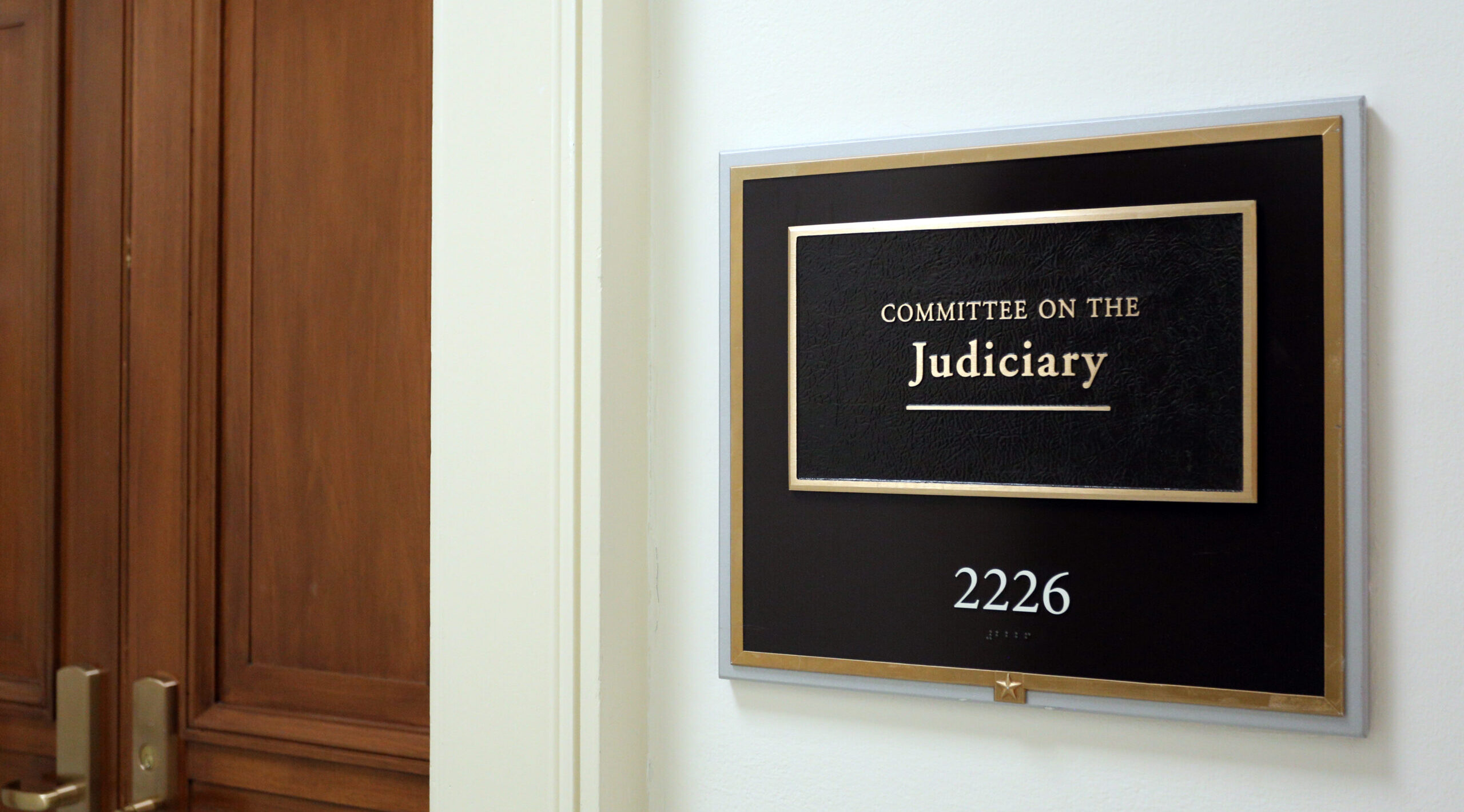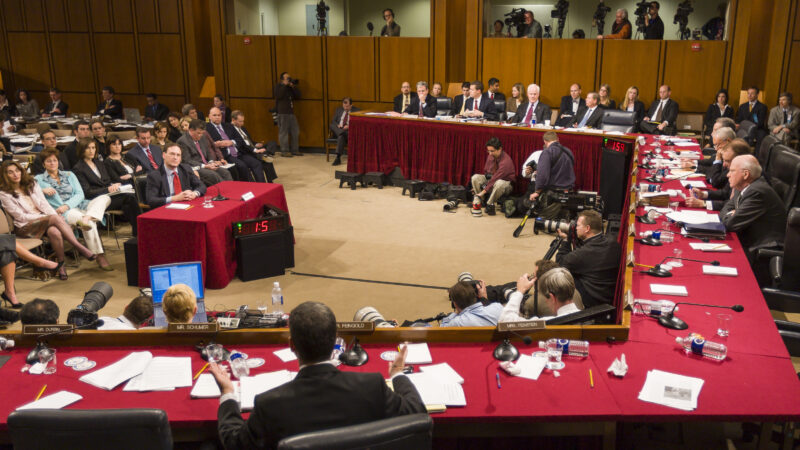Kristy Parker is Special Counsel at Protect Democracy. She leads litigation to secure accountability for abuses of executive power and interference with government functions, and leads advocacy to reform the Department of Justice and protect its independence from politicization.
Chris Wray’s testimony on the politicization of law enforcement is critical. We need more of it.
- July 11, 2023
This week, FBI Director Chris Wray is testifying before Congress: More of this, please!

This week, FBI head Chris Wray is scheduled to testify before the House Judiciary Committee in a hearing focused on congressional oversight of the FBI. Some members of the Committee may throw political grenades or chase harmful conspiracy theories during Wray’s testimony, but their misuse of critical question time should not detract from the importance and legitimacy of Wray’s testimony under oath in the People’s House.
Congressional oversight of the executive branch is often (and suboptimally) used as a vehicle for partisan point-scoring. But it is nevertheless a fundamental component of our democracy’s system of checks and balances. And it’s hard to imagine a more appropriate target for congressional oversight than the FBI Director who oversaw the agency’s actions (and inactions) leading up to and during the January 6, 2021 assault on the Capitol, and who has since overseen extraordinarily sensitive criminal investigations into former, current, and potentially future presidents and their closest allies.
Yes, the current House majority has played into the common framing of congressional oversight as a political food fight by prejudging the outcome of their hearing. They’ve teased revelations of “politicization of the nation’s preeminent law enforcement agency” and “weaponizing” of the FBI against Donald Trump, Catholics, Republican-controlled school boards, and others while giving Hunter Biden a “sweetheart” deal because he’s the president’s son.
But even if presuming answers to questions about “weaponization” and unfair treatment is far from best investigative practices, asking probing questions on those topics is not just a legitimate but an essential exercise of congressional power. We hope that at least some members of the House Judiciary Committee will use tomorrow’s hearing to do just that.
Read: Key questions to assess whether investigation or prosecution is appropriate — or an abuse of power Read: Key questions to assess whether investigation or prosecution is appropriate — or an abuse of power
At this moment, the Justice Department is conducting criminal investigations of:
- Former president (and current GOP 2024 frontrunner) Donald Trump, who is charged in an indictment overseen by Special Counsel Jack Smith with violating the Espionage Act, and who is the subject of a separate investigation of his alleged attempt to overthrow the 2020 election;
- Current president, Joe Biden, who is under investigation by a Special Counsel, for his handling of classified materials; and
- The current president’s son, Hunter Biden, who is under investigation by a Trump-appointed United States Attorney for various issues related to his business dealings. That investigation recently resulted in a plea agreement in which Biden will plead guilty to two misdemeanor tax offenses and admit the facts of a gun charge, and which will likely result in a sentence of probation.
And previous congressional investigations have uncovered evidence that blindspots or bias about threats posed by white nationalists and far-right militia groups contributed to the FBI’s failure to take necessary steps to prevent the January 6 insurrection.
While the House majority may not be hiding their political intentions, the premise of the Judiciary Committee’s hearing — that the Justice Department should conduct its investigations and prosecutions of individuals independent of partisan political interference, no matter who they are or what their political status is — is correct and central to maintaining our democratic form of government grounded in the rule of law.
The subject of the Wray hearing is especially important when at least two GOP presidential candidates have rejected the norm of an independent Justice Department and Trump has explicitly pledged to use it instead as a tool to retaliate against the president’s perceived enemies. Reaffirming that norm and ensuring its enforcement is an important congressional function.
Protect Democracy has published a guide with key questions to help the public determine whether our government’s political branches are using their criminal and congressional investigative powers appropriately. When we assess the propriety of congressional oversight, here are a few questions we should ask:
- Is there a legitimate basis for oversight — i.e., does the investigation broadly relate to existing or possible legislation?
- Is Congress following an appropriate process for conducting oversight — i.e., is Congress seeking information from high-ranking officials with the expertise and authority to answer their questions?
- Is Congress improperly interfering with the executive branch’s law enforcement work — i.e., is Congress seeking information that would compromise ongoing investigations?
The answers to those questions make clear that Congress should question the FBI Director under oath about the ongoing investigations. And that the upcoming hearing with Director Wray is a legitimate exercise of congressional authority.
Whether the Justice Department is conducting investigations of high-ranking political figures and their family members in accordance with existing laws and rule-of-law principles is certainly an appropriate basis for oversight (although Congress should not ask and Wray should not answer any question that would compromise the ongoing investigations). And the FBI Director is an appropriate person to question under oath on that subject.
To ensure proper independence, Congress could ask Mr. Wray whether anyone at the White House had any role in the ongoing investigations and whether the Attorney General has had any role in directing investigations currently being conducted by Special Counsels or the Trump-appointed United States Attorney for Delaware.
It can ask what safeguards the Justice Department and the Biden administration have established to protect the independence of the investigations and whether they are being followed.
It can also ask questions about whether the FBI is treating cases alike and otherwise following the procedures and standards laid out in the FBI’s Domestic Investigations and Operations Guide and the Justice Manual. And, as noted above, the Committee should inquire into why the FBI may have ignored warnings regarding the assault on the Capitol on January 6. This is especially so when current presidential candidates are promising to flout democratic norms in ways that raise serious concerns about the prospect of future insurrections.
The Durham investigation is Exhibit A for actual weaponized justice The Durham investigation is Exhibit A for actual weaponized justice
Of course, the fact that Congress should conduct meaningful oversight of whether the Justice Department and FBI are functioning independently and competently doesn’t mean that this hearing will meet that objective. In assessing the ultimate value of the Wray hearing, the public should watch to see whether members ask the aforementioned and other related questions. And they should listen carefully to the answers — as well as evaluate the evidence in the public record for themselves, especially the compelling evidence that the Justice Department’s current investigations are being conducted in accordance with the facts, law, and governing internal principles.
If the hearing is devoted to members expressing their own conclusions about the investigations rather than asking questions and seeking information, that will be a strong indication that they are not conducting it for the purpose of educating their constituents. But even if that is the case, it doesn’t mean that the hearing is illegitimate — it means that the public needs to demand that its elected representatives use congressional oversight in the right way. After all, members of Congress are the people’s representatives charged with providing their constituents the information they need to perform their role as citizens and voters in a democracy.
And our democracy needs more hearings in which high-ranking officials answer serious questions about the exercise of their constitutional powers, not fewer.
Related Content
Join Us.
Building a stronger, more resilient democracy is possible, but we can’t do it alone. Become part of the fight today.
Donate
Sign Up for Updates Sign Up for Updates
Explore Careers Explore Careers
How to Protect Democracy How to Protect Democracy



